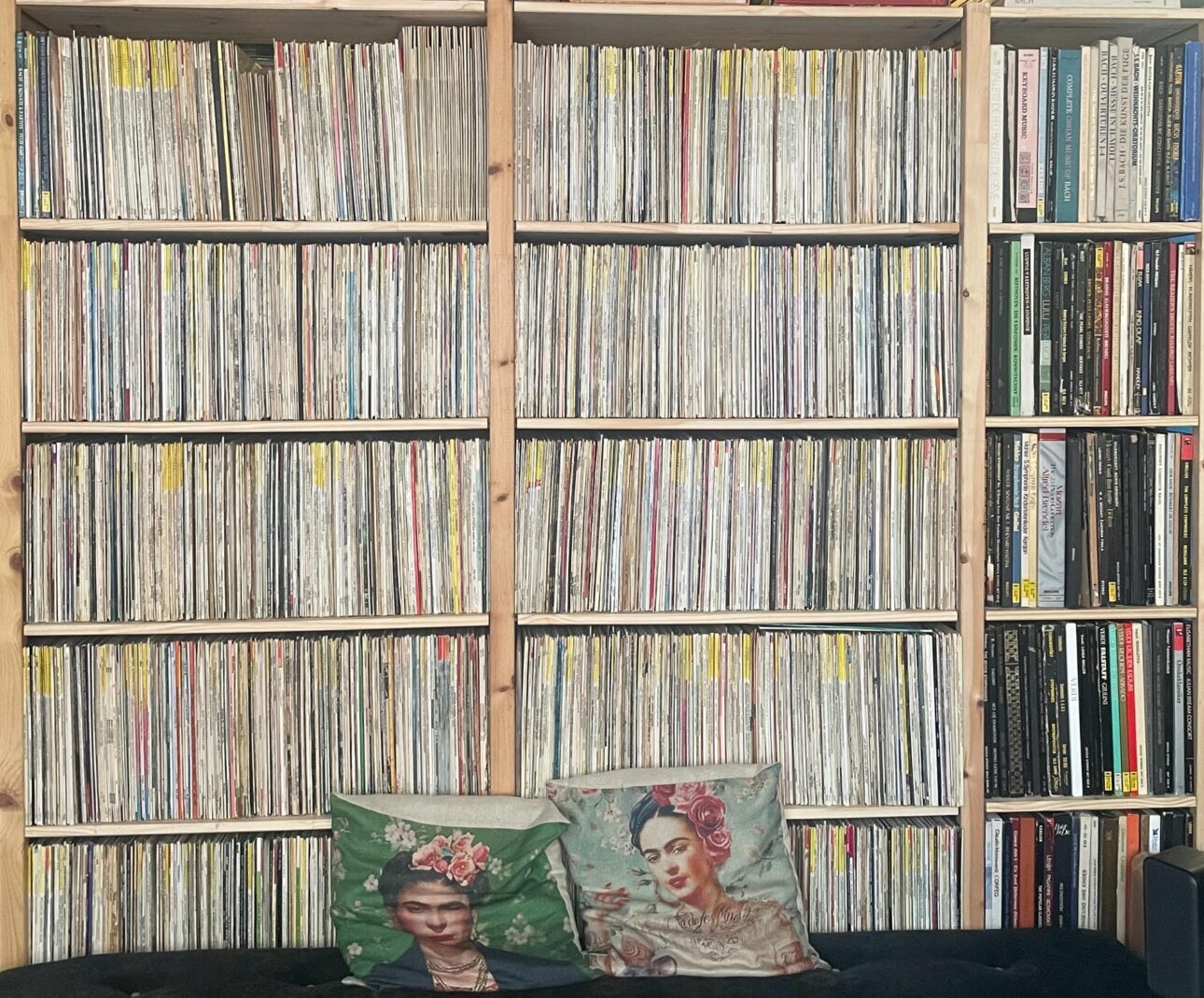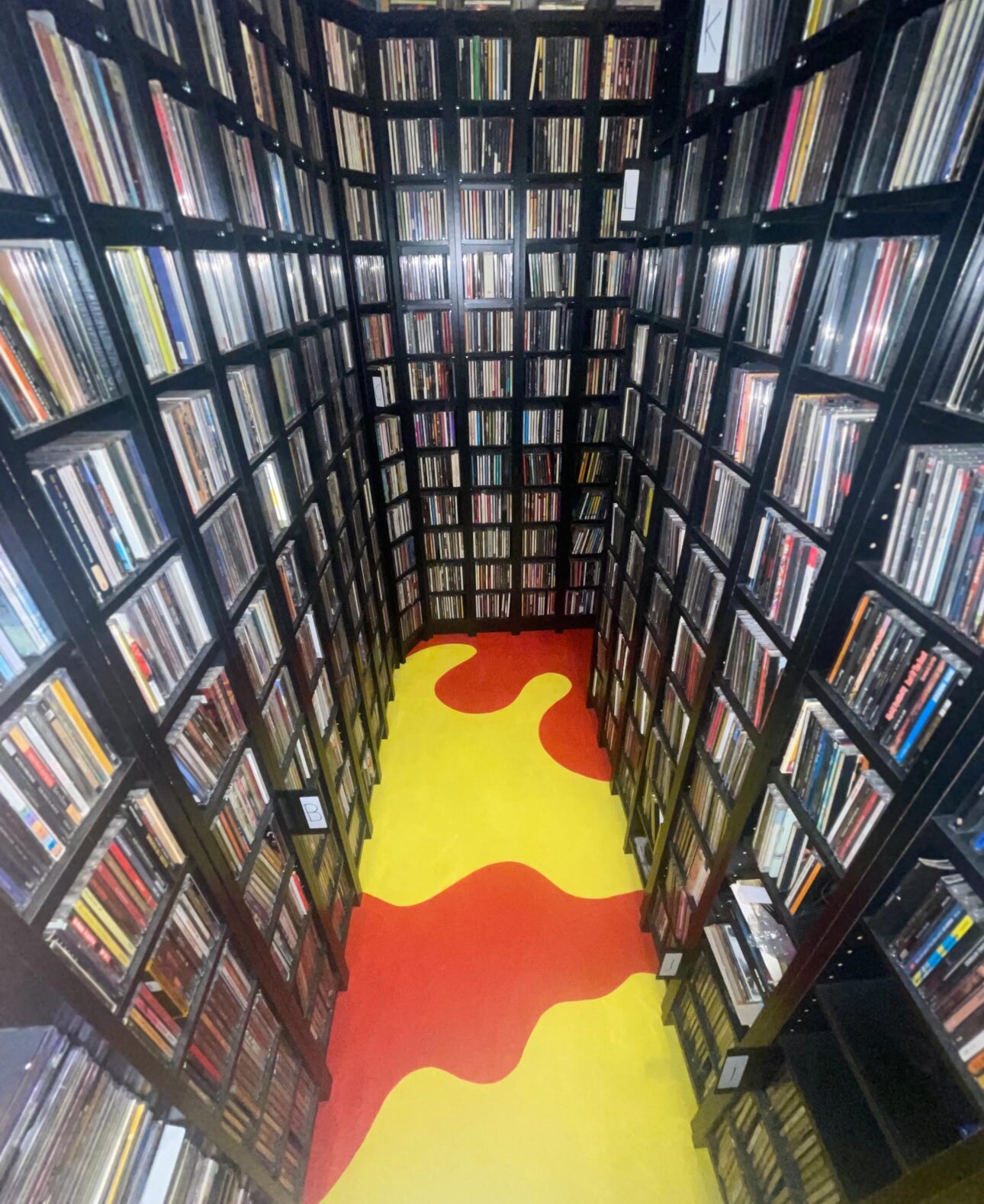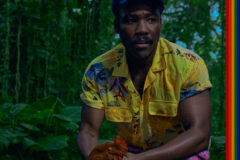For all intents and purposes, Rua de Coelho Neto is just your typical busy Porto street, populated with snack bars and a steady stream of passersby who jostle for space on the narrow sidewalk. Tucked away next to a Colombian restaurant stands an ordinary-looking building, furnished with tall storefront windows and entrance steps, that you’d quite easily pass by without turning your head. The 2,000-square-foot space was previously a funeral home, according to locals, and in more recent decades had been a clinical laboratory. Inside, the faucets and washbasins that adorn each room still bear witness to its past existence.
However, the lab has now been given a new lease of life as a vibrantly hued, maze-like music archive and hub, which will be opened up to creatives visiting or living in the Portuguese city. Created by guitarist Marty Willson-Piper of Australian psych-pop icons the Church, the In Deep Music Archive houses an expansive, painstakingly curated collection of over 65,000 vinyl records. To put things into perspective, that’s about the same as legendary California beatmaker DJ Shadow (per Questlove’s estimate) and not far off the 70,000-rich haul famously sold by Elton John for his AIDS Foundation charity in 1993. Add to this the 15,000 CDs, cassettes, stacks of prime vintage gear (which includes Rickenbacker 6- and 12-strings and a Roland space echo unit), and memorabilia-like signed concert posters and David Bowie Barbie dolls, and you’ve got a veritable candy shop for music enthusiasts. Virtuosic drummer Virgil Donati, members of Brian Jonestown Massacre, and Dais Records mavericks Drab Majesty have all paid the archive a visit since Willson-Piper and his wife Olivia first sourced the premises in spring 2023.


“Porto is really neighborly,” says Willson-Piper, nursing a ginger tea in the archive’s studio area. “We’re mates with Luís and Joaquim across the road in the restaurant, and they have a deck outside, so when the summer comes along it’s all really vibey.” Willson-Piper, also known for his work with All About Eve, the Saints, and Anekdoten, has been accumulating vinyl since the ‘60s, gathering treasure from global record-store hunts alongside contributions from friends, fans, and labels. As we browse through the collection, we stumble across a CD copy of the Go-Betweens’ landmark album 16 Lovers Lane, given to him by the band’s late co-founder Grant McLennan in London.
Among his prized vinyl possessions are a copy of the Beatles’ 1966 Yesterday and Today LP (aka the “Beatles Butcher” record), a “really valuable” vinyl by Aussie psych overlords Tamam Shud, and what he describes as the “Russian White Album,” a self-titled album by rock trailblazers Aquarium, which had been buried in boxes for years. There are also 14 different copies of Mike Oldfield’s 1973 masterpiece Tubular Bells and a recently gifted version of David Gilmour’s Live In Gdańsk 2008 box set, which was badly damaged. “That’s the thing—even if you don’t like a particular record or type of music, everything has a story,” he says of his genre-spanning hoard.


So how do you transport 65,000 records across the sea? “It was a massive logistical nightmare,” confirms Willson-Piper, who in March 2024 removed the vinyl from its storage home in Penzance, Cornwall and packed an eye-watering 1,500 boxes into one and a half semi-trailer trucks. They launched a fundraiser on GoFundMe to help with the costs. “About a thousand records experienced water damage at the storage space,” he says, gesturing to a huge pile that still needs to be cleaned. “The records are fine, but some of the covers are completely fucked, so it’s a bit of a drag.”
After securing a place with a five-year rental contract, they proceeded to unpack and set about sprucing up the formerly beige archive, adding pops of primary colour and hot pinks on the walls and painting psychedelic swirls on the floors. Everywhere you look, trinkets and curios catch the eye, from the secondhand-store-fetched mannequins that loom beside the €100 piano to the skull collection that sits underneath a signed poster of Milla Jovovich. The front room is where all the classical, country, soundtracks, easy listening, and compilations reside while the remaining bulk of the records are rendered in an “organizational spiral,” meaning A-Z rock and pop segues into Irish, English, Scottish, American folk, Australian, and New Zealand selections, before unfurling into ‘70s soul, funk, disco, ‘80s soul, funk and disco, and so on. And that’s just skimming the surface.


Elsewhere, in a bubblegum-coloured room at the end of the corridor, there’s an extensive library of music reference books, encyclopedias, catalogues, biographies, and magazines, including a vintage NME from the height of punk in 1977. There are also plenty of VHS, DVDs, and laser discs. Then there’s the audio cave, fitted out with Bowers & Wilkins speakers, a Nad 314 amp, and a Linn Basik turntable primed for “deep listening sessions.” Behind the “world’s most comfortable sofa,” you can see an array of guitars pinned up while plentiful amps are lined up against the wall. “The great thing about being alive for 5,000 years is that you got to buy things before they were trendy and expensive,” he jokes.
Willson-Piper continues: “We want people to come here to collaborate with me. We’ve got the best sampling library in the world. I mean, talk about a sampling library,” he says of the archive’s ultimate aim. Additionally, the space intends to serve as a songwriting residence and a coworking space for creatives. In the future, the Willson-Pipers also hope to host small, house concert-style performances that “bring music to life in a cozy, personal atmosphere.”
The In Deep Music Archive is a labor of love that pays homage to the warm crackle and allure of vinyl—and of listening to a record from start to finish.
“I always remember that thing about Julian Cope where he collected old toy cars,” muses Willson-Piper. “When you bought those in 1962, you got the box, threw it away, and then played with the car. It got damaged, and then you threw it away when you were 19. Now, if you’ve got that car, in that box, it’s worth a lot of money.
“Records…aren’t they great?”

